79 start with E start with E
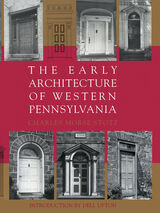
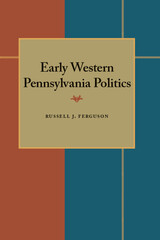

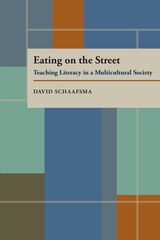
During a field trip in Detroit on a summer day in 1989, a group of African American fifth-, sixth-, and seventh-graders talked, laughed, and ate snacks as they walked. Later, in the teacher’s lounge, Jeanetta, an African American teacher chided the teachers, black and white, for not correcting poor black students for “eating on the street,” something she saw as stereotypical behavior that stigmatized students.
These thirty children from Detroit’s Cass Corridor neighborhood were enrolled in the Dewey Center Community Writing Project. Taught by seven teachers from the University of Michigan and the Detroit public schools, the program guided students to explore, to interpret, and to write about their community.
According to David Schaafsma, one of the teachers, the “eating on the street” controversy is emblematic of how cultural values and cultural differences affect education in American schools today. From this incident Schaafsma has written a powerful and compelling book about the struggle of teaching literacy in a racially divided society and the importance of story and storytelling in the educational process.
At the core of this book is the idea of storytelling as an interactive experience for both the teller and listener. Schaafsma begins by telling his own version of the “eating on the street” conflict. He describes the history of the writing program and offers rich samples of the students’ writing about their lives in a troubled neighborhood. After the summer program, Schaafsma interviewed all the teachers about their own version of events, their personal histories, and their work as educators. Eating on the Street presents all of these layered stories - by Schaafsma, his collegues, and the students - to illustrate how talking across multiple perspectives can enrich the learning process and the community-building process outside the classroom as well.
These accounts have strong implications for multicultural education today. They will interest teachers, educational experts, administrators, and researchers. Uniting theory and practice, Eating on the Street is on the cutting edge of pioneering work in educational research.

The legends of Cyrus the Great, from the early Greek world, and Lucretia, of early Rome, recount stories of transgression of rights; the first against a people, the second against an individual. The Greeks of the time of Cyrus, in the 5th century BC, believed that history taught them about an inexorable and divinely ordained law of ethics meant to punish the overweening transgressor. The citizens of Lucretia's Rome were motivated by a solemn respect for the sanctity of women and of the home. In both legends, it is an individual woman's courage and determination that brings the offender to his rightful doom, although, in the process of this retribution, both women suffer great loss.
Young shows how the telling of these great legends, which have gathered strength and beauty from each retelling, echo down through the centuries and throughout the Western World, influencing and enlightening societies and individuals.

A room’s acoustic character seems at once the most technical and the most mystical of concerns. Since the early Enlightenment, European architects have systematically endeavored to represent and control the propagation of sound in large interior spaces. Their work has been informed by the science of sound but has also been entangled with debates on style, visualization techniques, performance practices, and the expansion of the listening public. Echo’s Chambers explores how architectural experimentation from the seventeenth through the mid-twentieth centuries laid the groundwork for concepts of acoustic space that are widely embraced in contemporary culture. It focuses on the role of echo and reverberation in the architecture of Pierre Patte, Claude-Nicolas Ledoux, Carl Ferdinand Langhans, and Le Corbusier, as well as the influential acoustic ideas of Athanasius Kircher, Richard Wagner, and Marshall McLuhan. Drawing on interdisciplinary theories of media and auditory culture, Joseph L. Clarke reveals how architecture has impacted the ways we continue to listen to, talk about, and creatively manipulate sound in the physical environment.



In the 1970's, an “age of affluence” ended abruptly in Canada, Great Britain, and the United States. Skyrocketing inflation, persistent unemployment, and sluggish growth became new, oppressive realities for government and citizens alike. This book examines the changes that occurred in economic policymaking on the governmental level and the public's response to such changes. This timely collection of essays sheds light on the political economy of three of the world's oldest democracies in an era of economic distress and uncertainty.
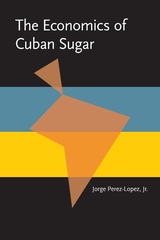
Pérez-López examines the various efforts at economic planning in the years following the Revolution and provides in-depth analysis of aspects particular to the sugar industry: cultivation, mechanization, energy and transportation, refining and the manufacture of sugar derivatives, production costs, and foreign trade.
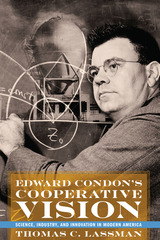
Edward Condon’s Cooperative Vision explores the life cycle of that vision during the Great Depression, the Second World War, and the early Cold War. Condon’s cooperative model of research and development evolved over time and by consequence laid bare sharp disagreements among academic, corporate, and government stakeholders about the practical value of new knowledge, where and how it should be produced, and ultimately, on whose behalf it ought to be put to use.
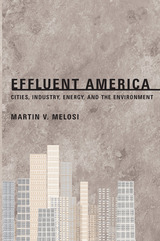

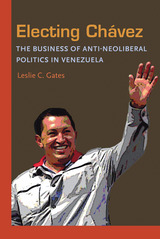
In Electing Chávez, Leslie C. Gates examines how Chávez won over voters and even obtained the secret allegiance of a group of business “elite outliers,” with a reinterpretation of the relationship between business and the state during Venezuela’s era of two-party dominance (1959-1998). Through extensive research on corruption and the backgrounds of political leaders.
Gates tracks the rise of business-related corruption scandals and documents how business became identified with Venezuela’s political establishment. These trends undermined the public’s trust in business and converted business opposition into an asset for Chávez. This long history of business-tied politicians and the scandals they often provoked also framed the decisions of elite outliers. As Gates reveals, elite outliers supported Chávez despite his anti-neoliberal stance because they feared that the success of Chávez’s main rival would deny them access to Venezuela’s powerful oil state.

The poems were written in the six years following publication of his previous book, The Widening Spell of the Leaves, and continue and extend the jazz improvisations on themes that gave those poems their resonance. There are poems of sudden stops and threats from the wild: an opossum halts traffic and snaps at pedestrians in posh west Los Angeles; a migrant worker falls victim to the bites of two beautiful black widow spiders; horses starve during a Russian famine; a thief, sitting in the rigging of Columbus’s ship, contemplates his work in the New World. The collection culminates in the elegies written to a world in which culture fragments; in which the beasts of burden—the horses, the migrant workers—are worked toward death; a world in which "Love's an immigrant, it shows itself in its work. / It works for almost nothing"; a world in which "you were no longer permitted to know, / Or to decide for yourself, / Whether there was an angel inside you, or whether there wasn't."
Elegy, as Levine says, was "written by one of our essential poets at the very height of his powers. His early death is a staggering loss for our poetry, but what he left is a major achievement that will enrich our lives."

In Elegy on Toy Piano, Dean Young's sixth book of poems, elegiac necessity finds itself next to goofy celebration. Daffy Duck enters the Valley of the Eternals. Faulkner and bell-bottoms cling to beauty's evanescence.
Even in single poems, Young's tone and style vary. No one feeling or idea takes precedence over another, and their simultaneity is frequently revealed; sadness may throw a squirrelly shadow, joy can find itself dressed in mourning black. As in the agitated "Whirlpool Suite": "Pain / and pleasure are two signals carried / over one phoneline."
In taking up subjects as slight as the examination of a signature or a true/false test, and as pressing as the death of friends, Young's poems embrace the duplicity of feeling, the malleability of perception, and the truth telling of wordplay.
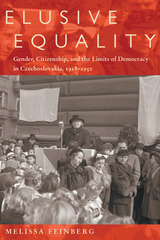
When Czechoslovakia became independent in 1918, Czechs embraced democracy, which they saw as particularly suited to their national interests. Politicians enthusiastically supported a constitution that proclaimed all citizens, women as well as men, legally equal. But they soon found themselves split over how to implement this pledge. Some believed democracy required extensive egalitarian legislation. Others contended that any commitment to equality had to bow before other social interests, such as preserving the traditional family.
On the eve of World War II, Czech leaders jettisoned the young republic for an “authoritarian democracy” that firmly placed their nation, and not the individual citizen, at the center of politics. In 1948, they turned to a Communist-led “people's democracy,” which also devalued individual rights.
By examining specific policy issues, including marriage and family law, civil service regulations, citizenship law, and abortion statutes, Elusive Equality demonstrates the relationship between Czechs' ideas about gender roles and their attitudes toward democracy. Gradually, many Czechs became convinced that protecting a traditionally gendered family ideal was more important to their national survival than adhering to constitutionally prescribed standards of equal citizenship. Through extensive original research, Melissa Feinberg assembles a compelling account of how early Czech progress in women's rights, tied to democratic reforms, eventually lost momentum in the face of political transformations and the separation of state and domestic issues. Moreover, Feinberg presents a prism through which our understanding of twentieth-century democracy is deepened, and a cautionary tale for all those who want to make democratic governments work.
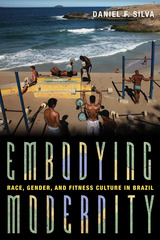
Embodying Modernity examines the current boom of fitness culture in Brazil in the context of the white patriarchal notions of race, gender, and sexuality through which fitness practice, commodities, and cultural products traffic. The book traces the imperial meanings and orders of power conveyed through “fit” bodies and their different configurations of muscularity, beauty, strength, and health within mainstream visual media and national and global public spheres. Drawing from a wide range of Brazilian visual media sources including fitness magazines, television programs, film, and social media, Daniel F. Silva theorizes concepts and renderings of modern corporality, its racialized and gendered underpinnings, and its complex relationship to white patriarchal power and capital. This study works to define the ubiquitous parameters of fitness culture and argues that its growth is part of a longer collective nationalist project of modernity tied to whiteness, capitalist ideals, and historical exceptionalism.

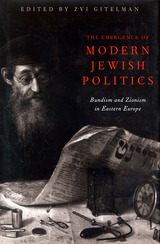
While Zionism achieved its primary aim—the founding of a Jewish state—the Jewish Labor Bund has not only practically disappeared, but its ideals of socialism and secular Jewishness based in the diaspora seem to have failed. Yet, as Zvi Gitelman and the various contributors argue, it was the Bund that more profoundly changed the structure of Jewish society, politics, and culture.
In thirteen essays, prominent historians, political scientists, and professors of literature discuss the cultural and political contexts of these movements, their impact on Jewish life, and the reasons for the Bund’s demise, and they question whether ethnic minorities are best served by highly ideological or solidly pragmatic movements.
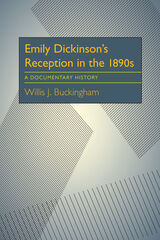
This work reprint, annotates, and indexes virtually all mention of Emily Dickinson in the first decade of her publication, tripling the known references to the poet during the nineties. Much of this material, drawn from scrapbooks of clippings, rare journals, and crumbling newspapers, was on the verge of extinction.
Modern audiences will be struck by the impact of Dickinson’s poetry on her first readers. We learn much about the taste of the period and the relationship between publishers, reviewers, and the reading public. It demonstrates that Dickinson enjoyed a wider popular reception than had been realized: readers were astonished by her creative brilliance.
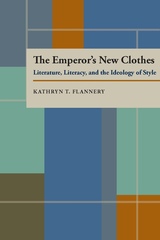
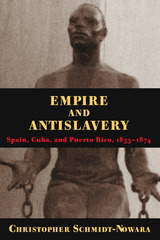

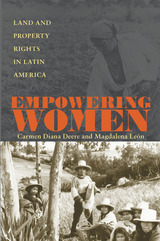

The Empty Garden draws a portrait of Milton as a cultural and religious critic who, in his latest and greatest poems, wrote narratives that illustrate the proper relationships among the individual, the community, and God. Rushdy argues that the political theory implicit in these relationships arises from Milton’s own drive for self-knowledge, a kind of knowledge that gives the individual freedom to act in accordance with his or her own understanding of God’s will rather than the state’s. Rushdy redefines Milton’s creative spirit in a way that encompasses his poetic, political, and religious careers.
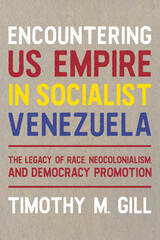
Since the end of World War II, the United States has come to dominate the world economically and politically, leading many to describe the United States as an empire. Scholars have analyzed how the US government has worked through international financial institutions, its Central Intelligence Agency, and outright warfare to achieve its will. In this book, Timothy M. Gill spotlights how the US government also worked through democracy promotion to undermine governments abroad, including in Venezuela. President Hugo Chávez, who ruled from 1999 until his death in 2013, was among the democratically elected Latin American state leaders who embraced socialism and challenged the idea of US global power. Gill shows how US government agencies funded and trained opposition parties and activists, and how such intervention often was justified in neocolonial and racist terms. Through analysis of documents obtained through Freedom of Information Act requests, embassy cables, and interviews with US government and Venezuelan nonprofit members, Gill details such operations and the imperial thinking behind them.
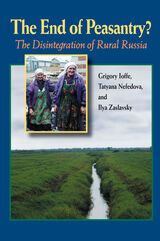
The End of Peasantry? examines the dramatic recent decline of agriculture in post-Soviet Russia. Historically, Russian farmers have encountered difficulties relating to the sheer abundance of land, the vast distances between population centers, and harsh environmental conditions. More recently, the drastic depopulation of rural spaces, decreases in sown acreage, and overall inefficiency of land usage have resulted in the disruption and spatial fragmentation of the countryside. For many decades, rural migration has been a selective process, resulting in the most enterprising and self-motivated people leaving the rural periphery. The new agricultural operators representing nascent but aggressive Russian agribusiness have difficulty co-opting traditional rural communities afflicted by profound social dysfunction. The contrast between agriculture in proximity to large cities and in their hinterlands is as sharp as ever, and some vacant niches are increasingly occupied by ethnically non-Russian migrants. All of these conditions existed to some degree in pre-Soviet times, but they have been exacerbated since Russia took steps toward a market economy.
Understudied and often underestimated in the West, the crisis facing Russian agriculture has profound implications for the political and economic stability of Russia. The authors see hope in the significant increase in land use intensity on vastly diminished farmland. The lessons gathered from this thoroughly researched study are far-reaching and relevant to the disciplines of Slavic and European studies, agriculture, political science, economics, and human geography.
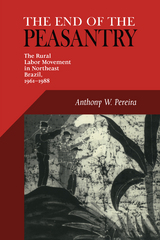
The rural labor movement played a surprisingly active role in Brazil’s transition to democracy in the 1980s. While in most Latin American countries rural labor was conspicuously marginal, in Brazil, an expanded, secularized, and centralized movement organized strikes, staged demonstrations for land reform, demanded political liberalization, and criticized the government’s environmental policies.
In this ground-breaking book, Anthony W. Pereira explains this transition as the result of two intertwined processes - the modernization of agricultural production and the expansion of the welfare state into the countryside - and explores the political consequences of these processes, occurring not only in Latin America but in much of the Third World.

"Known for his commanding stage presence as a reader, McDaniel trades hard in his fourth book on his rough-and-tumble persona--a recovering addict from the working class streets--while also showing softer sides. McDaniel's sometimes awkward, if earnest searching might just be what allows him to find moments of great beauty, humor and stillness." --Publishers Weekly
“McDaniel is known for his talent performing his poems, however his voice doesn’t lose its impact in written form. It may be more powerful because the reader can view the poet’s unique ideas and phrases over and over until their various meanings sink in.” —Gently Read Literature
"McDaniel zings metaphors across the page like he's the Robin Williams of poetry. This collection in frequently moving and inventive with enough lightheartedness and whimsy to balance the heaviness of the darker moments." --hipbooksterclub.com
Jeffrey McDaniel is the author of Alibi School, The Forgiveness Parade, and The Splinter Factory. His work has appeared in a number of anthologies, including Best American Poetry 1994, The Outlaw Bible of American Poetry, and New (American) Poets. He has won several awards, including an NEA Fellowship. He teaches creative writing at Sarah Lawrence College.
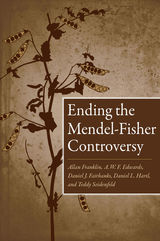
In Ending the Mendel-Fisher Controversy, leading experts present their conclusions on the legendary controversy surrounding the challenge to Mendel's findings by British statistician and biologist R. A. Fisher. In his 1936 paper “Has Mendel's Work Been Rediscovered?” Fisher suggested that Mendel's data could have been falsified in order to support his expectations. Fisher attributed the falsification to an unknown assistant of Mendel's. At the time, Fisher's criticism did not receive wide attention. Yet beginning in 1964, about the time of the centenary of Mendel's paper, scholars began to publicly discuss whether Fisher had successfully proven that Mendel's data was falsified. Since that time, numerous articles, letters, and comments have been published on the controversy.
This self-contained volume includes everything the reader will need to know about the subject: an overview of the controversy; the original papers of Mendel and Fisher; four of the most important papers on the debate; and new updates, by the authors, of the latter four papers. Taken together, the authors contend, these voices argue for an end to the controversy-making this book the definitive last word on the subject.

In Endurable Infinity, Tony Kitt creates his own tangential surrealism through wonder, intuition, and surprising connections. If the original surrealists of the 1930s sought to unleash the unconscious mind by bringing elements of dreams to the waking world with jarring juxtapositions, Kitt’s poetry is more about transmutation, or leaps, from word to word and phrase to phrase. He takes American poet Charles Borkhuis’s statement that contemporary surrealist poets write “from inside language” as a challenge and a call to action.
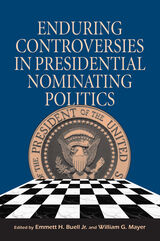
Enduring Controversies in Presidential Nominating Politics retraces the more than two hundred-year history of presidential elections in the United States to provide a primer on how the process has evolved from the days of the founders, through the heyday of nominating conventions, to today’s overwhelming interest in early primaries.
Original essays by the editors introduce, critique, and occasionally even refute a wide variety of historical readings including Alexander Hamilton’s defense of election procedures, excerpts of individual states’ nominations of candidates in 1824, an overview of the impact television has had on nominating conventions, and calls for a national rotating primary scheme in 2004. As a whole, the collection reveals the common threads that run through the history of the nominating process, and points out that today’s litany of complaints is not at all new.
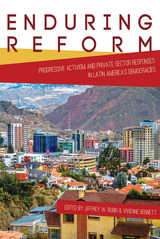
Enduring Reform presents five case studies from Mexico, Brazil, and Argentina in which marginalized groups have successfully forged new cultural and economic spaces and won greater autonomy and political voice. Bringing together NGO’s, local institutions, social movements, and governments, these initiatives have developed new mechanisms to work ‘within the system,’ while also challenging the system’s logic and constraints.
Through firsthand interviews, the contributors capture local businesspeople’s understandings of these progressive initiatives and record how they grapple with changes they may not always welcome, but must endure. Among their criteria, the contributors evaluate the degree to which businesspeople recognize and engage with reform movements and how they frame electoral counterproposals to reformist demands. The results show an uneven response to reform, dependent on cultural as much or more than economic factors, as businesses move to decipher, modify, collaborate with, outmaneuver, or limit progressive innovations.
From the rise of worker-owned factories in Buenos Aires, to the collective marketing initiatives of impoverished Mayans in San Cristóbal de las Casas, the success of democracy in Latin America depends on powerful and cooperative social actions and actors, including the private sector. As the cases in Enduring Reform show, the democratic context of Latin America today presses businesspeople to endure, accept, and at times promote progressive change in unprecedented ways, even as they act to limit and constrain it.
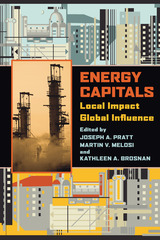
With case studies from the United States, Canada, Mexico, Norway, Africa, and Australia, this volume views a range of older and more recent energy capitals, contrasts their evolutions, and explores why some capitals were able to influence global trends in energy production and distribution while others failed to control even their own destinies. Chapters show how local and national politics, social structures, technological advantages, education systems, capital, infrastructure, labor force, supply and demand, and other factors have affected the ability of a region to develop and control its own fossil fuel reserves. The contributors also view the environmental impact of energy industries and demonstrate how, in the depletion of reserves or a shift to new energy sources, regions have or have not been able to recover economically.
The cities of Tampico, Mexico, and Port Gentil, Gabon, have seen their oil deposits exploited by international companies with little or nothing to show in return and at a high cost environmentally. At the opposite extreme, Houston, Texas, has witnessed great economic gain from its oil, natural gas, and petrochemical industries. Its growth, however, has been tempered by the immense strain on infrastructure and the human transformation of the natural environment. In another scenario, Perth, Australia, Calgary, Alberta, and Stavanger, Norway have benefitted as the closest established cities with administrative and financial assets for energy production that was developed hundreds of miles away.
Whether coal, oil, or natural gas, the essays offer important lessons learned over time and future considerations for the best ways to capture the benefits of energy development while limiting the cost to local populations and environments.


Houston's meteoric rise from a bayou trading post to the world's leading oil supplier owes much to its geography, geology, and climate: the large natural port of Galveston Bay, the lush subtropical vegetation, the abundance of natural resources. But the attributes that have made it attractive for industry, energy, and urban development have also made it particularly susceptible to a variety of environmental problems. Energy Metropolis presents a comprehensive history of the development of Houston, examining the factors that have facilitated unprecedented growth-and the environmental cost of that development.
The landmark Spindletop strike of 1901 made inexpensive high-grade Texas oil the fuel of choice for ships, industry, and the infant automobile industry. Literally overnight, oil wells sprang up around Houston. In 1914, the opening of the Houston Ship Channel connected the city to the Gulf of Mexico and international trade markets. Oil refineries sprouted up and down the channel, and the petroleum products industry exploded. By the 1920s, Houston also became a leading producer of natural gas, and the economic opportunities and ancillary industries created by the new energy trade led to a population boom. By the end of the twentieth century, Houston had become the fourth largest city in America.
Houston's expansion came at a price, however. Air, water, and land pollution reached hazardous levels as legislators turned a blind eye. Frequent flooding of altered waterways, deforestation, hurricanes, the energy demands of an air-conditioned lifestyle, increased automobile traffic, exponential population growth, and an ever-expanding metropolitan area all escalated the need for massive infrastructure improvements.
The experts in Energy Metropolis examine the steps Houston has taken to overcome laissez-faire politics, indiscriminate expansion, and infrastructural overload. What emerges is a profound analysis of the environmental consequences of large-scale energy production and unchecked growth.
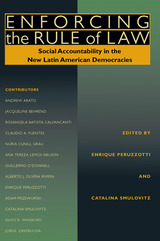
Reports of scandal and corruption have led to the downfall of numerous political leaders in Latin America in recent years. What conditions have developed that allow for the exposure of wrongdoing and the accountability of leaders? Enforcing the Rule of Law examines how elected officials in Latin American democracies have come under scrutiny from new forms of political control, and how these social accountability mechanisms have been successful in counteracting corruption and the limitations of established institutions.
This volume reveals how legal claims, media interventions, civic organizations, citizen committees, electoral observation panels, and other watchdog groups have become effective tools for monitoring political authorities. Their actions have been instrumental in exposing government crime, bringing new issues to the public agenda, and influencing or even reversing policy decisions.
Enforcing the Rule of Law presents compelling accounts of the emergence of civic action movements and their increasing political influence in Latin America, and sheds new light on the state of democracy in the region.

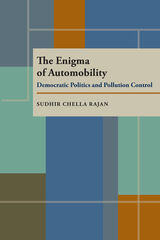


Entangled Itineraries traces this movement of knowledge across the Eurasian continent from the early years of the Common Era to the nineteenth century, following local goods, techniques, tools, and writings as they traveled and transformed into new material and intellectual objects and ways of knowing. Focusing on nonlinear trajectories of knowledge in motion, this volume follows itineraries that weaved in and out of busy, crowded cosmopolitan cities in China; in the trade hubs of Kucha and Malacca; and in centers of Arabic scholarship, such as Reyy and Baghdad, which resonated in Bursa, Assam, and even as far as southern France. Contributors explore the many ways in which materials, practices, and knowledge systems were transformed and codified as they converged, swelled, at times disappeared, and often reemerged anew.
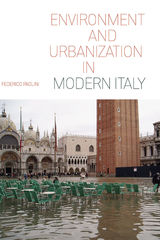
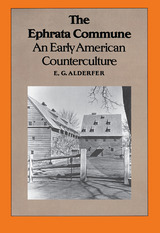
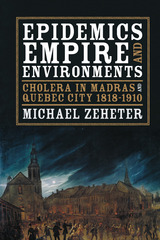
The colonial state in Quebec aimed to emulate British precedent and develop similar institutions that allowed authorities to prevent cholera by imposing quarantines and controlling the disease through comprehensive change to the urban environment and sanitary improvements. In Madras, however, the provincial government sought to exploit the colony for profit and was reluctant to commit its resources to measures against cholera that would alienate the city’s inhabitants. It was only in 1857, after concern rose in Britain over the health of its troops in India, that a civilizing mission of sanitary improvement was begun. As Zeheter shows, complex political and economic factors came to bear on the reshaping of each colony's environment and the urgency placed on disease control.

Epistemic logic is the branch of philosophical thought that seeks to formalize the discourse about knowledge. Its object is to articulate and clarify the general principles of reasoning about claims to and attributions of knowledge. This comprehensive survey of the topic offers the first systematic account of the subject as it has developed in the journal literature over recent decades.
Rescher gives an overview of the discipline by setting out the general principles for reasoning about such matters as propositional knowledge and interrogative knowledge. Aimed at graduate students and specialists, Epistemic Logic elucidates both Rescher's pragmatic view of knowledge and the field in general.
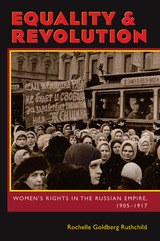
Ruthchild offers a telling examination of the dynamics present in imperialist Russia that fostered a growing feminist movement. Based upon extensive archival research in six countries, she analyzes the backgrounds, motivations, methods, activism, and organizational networks of early Russian feminists, revealing the foundations of a powerful feminist intelligentsia that came to challenge, and eventually bring down, the patriarchal tsarist regime.
Ruthchild profiles the individual women (and a few men) who were vital to the feminist struggle, as well as the major conferences, publications, and organizations that promoted the cause. She documents political party debates on the acceptance of women’s suffrage and rights, and follows each party’s attempt to woo feminist constituencies despite their fear of women gaining too much political power. Ruthchild also compares and contrasts the Russian movement to those in Britain, China, Germany, France, and the United States. Equality and Revolution offers an original and revisionist study of the struggle for women’s political rights in late imperial Russia, and presents a significant reinterpretation of a decisive period of Russian—and world—history.
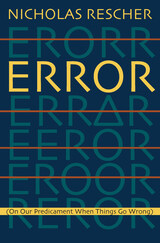
In Error, Nicholas Rescher presents a fresh analysis of the occurrence, causality, and consequences of error in human thought, action, and evaluation. Rescher maintains that error-avoidance and truth-achievement are distinct but equally important factors for rational inquiry, and that error is inherent in the human cognitive process (to err is human). He defines three main categories of error: cognitive (failure to realize truths); practical (failure related to the objective of an action); and axiological (failure in evaluation), and articulates the factors that contribute to each. His discussion also provides a historical perspective on the treatment of error in Greek philosophy, and by later thinkers such as Aquinas, Descartes, Spinoza, Leibniz, James, Royce, Moore, and Russell.
Error is an important reexamination of the significance of error to the fields of philosophical anthropology, epistemology, ontology, and theology. As Rescher’s study argues, truth and error are inexorably intertwined—one cannot exist without the other. Error is an unavoidable occurrence in the cognitive process—without missteps on the path to truth, truth itself cannot be attained. The risk of error is inherent in the quest for truth.
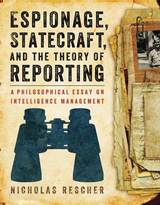
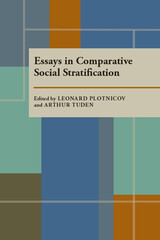
The essays in this volume represent trends in social stratification studies undertaken in major culture areas of the world. The empirical data of the chapters are set with special reference to the dynamics of processes within these diverse traditions and heritages as sources of comparison with one another and with the experiences of western societies.
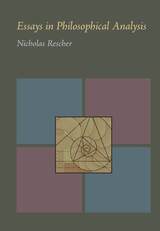
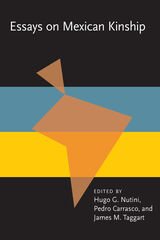
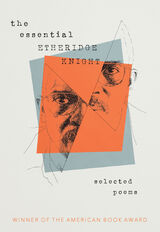


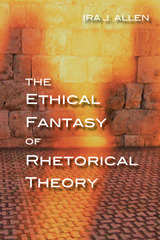
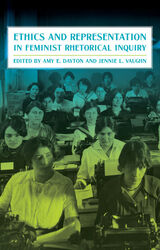
The historiography of feminist rhetorical research raises ethical questions about whose stories are told and how. Women and other marginalized people have been excluded historically from many formal institutions, and researchers in this field often turn to alternative archives to explore how women have used writing and rhetoric to participate in civic life, share their lived experiences, and effect change. Such methods may lead to innovation in documenting practices that took place in local, grassroots settings. The chapters in this volume present a frank conversation about the ways in which feminist scholars engage in the work of recovering hidden rhetorics, and grapple with the ethical challenges raised by this recovery work.

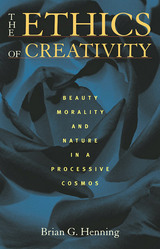
A central concern of nearly every environmental ethic is its desire to extend the scope of direct moral concern beyond human beings to plants, nonhuman animals, and the systems of which they are a part. Although nearly all environmental philosophies have long since rejected modernity’s conception of individuals as isolated and independent substances, few have replaced this worldview with an alternative that is adequate to the organic, processive world in which we find ourselves. In this context, Brian G. Henning argues that the often overlooked work of Alfred North Whitehead has the potential to make a significant contribution to environmental ethics. Additionally inspired by classical American philosophers such as William James, John Dewey and Charles Sanders Pierce and environmental philosophers such as Aldo Leopold, Peter Singer, Albert Schweitzer, and Arne Naess, Henning develops an ethical theory of which the seminal insight is called “The Ethics of Creativity.”
By systematically examining and developing a conception of individuality that is equally at home with the microscopic world of subatomic events and the macroscopic world of ecosystems, The Ethics of Creativity correctly emphasizes the well-being of wholes, while not losing sight of the importance of the unique centers of value that constitute these wholes. In this way, The Ethics of Creativity has the potential to be a unique voice in contemporary moral philosophy.

Eugenics movements gained momentum throughout Eastern Europe between World Wars I and II. Maria Bucur demonstrates that the importance of the eugenics movement in Romania rests not so much in the contributions made to the study of science as in the realm of nationalist ideology and social policy making.
The notion that the quality and quantity of the human species could and should be controlled manifested itself through social engineering projects ranging from reshaping gender roles and isolating ethnic undesirables to introducing broad public health measures and educational reform. Romanian eugenicists sought to control such modernization processes as urbanization and industrialization without curbing them, yet they also embraced attitudes more typically identified with anti-modernists in Romanian politics and culture.
Bucur is the first historian to explore the role of eugenics as a response to the challenges of nation- and state-building in Eastern Europe. She presents a balanced assessment of the interwar eugenics movement’s success and failures and identifies connections and discontinuities between the movement and the post-war communist regime.


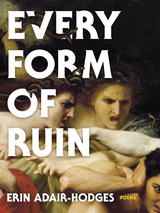


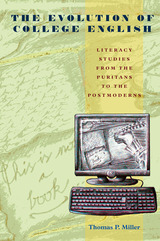
Thomas P. Miller defines college English studies as literacy studies and examines how it has evolved in tandem with broader developments in literacy and the literate. He maps out “four corners” of English departments: literature, language studies, teacher education, and writing studies. Miller identifies their development with broader changes in the technologies and economies of literacy that have redefined what students write and read, which careers they enter, and how literature represents their experiences and aspirations.
Miller locates the origins of college English studies in the colonial transition from a religious to an oratorical conception of literature. A belletristic model of literature emerged in the nineteenth century in response to the spread of the “penny” press and state-mandated schooling. Since literary studies became a common school subject, professors of literature have distanced themselves from teachers of literacy. In the Progressive era, that distinction came to structure scholarly organizations such as the MLA, while NCTE was established to develop more broadly based teacher coalitions. In the twentieth century New Criticism came to provide the operating assumptions for the rise of English departments, until those assumptions became critically overloaded with the crash of majors and jobs that began in 1970s and continues today.<br><br>
For models that will help the discipline respond to such challenges, Miller looks to comprehensive departments of English that value studies of teaching, writing, and language as well as literature. According to Miller, departments in more broadly based institutions have the potential to redress the historical alienation of English departments from their institutional base in work with literacy. Such departments have a potentially quite expansive articulation apparatus. Many are engaged with writing at work in public life, with schools and public agencies, with access issues, and with media, ethnic, and cultural studies. With the privatization of higher education, such pragmatic engagements become vital to sustaining a civic vision of English studies and the humanities generally.
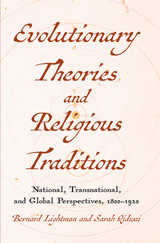
How Intellectuals and Global Publics Viewed the Relationship between Evolution and Diverse Religious Traditions
Before the advent of radio, conceptions of the relationship between science and religion circulated through periodicals, journals, and books, influencing the worldviews of intellectuals and a wider public. In this volume, historians of science and religion examine that relationship through diverse mediums, geographic contexts, and religious traditions. Spanning within and beyond Europe and North America, chapters emphasize underexamined regions—New Zealand, Australia, India, Argentina, Sri Lanka, Egypt, and the Ottoman Empire—and major religions of the world, including Christianity, Hinduism, Buddhism, Confucianism, and Islam; interactions between those traditions; as well as atheism, monism, and agnosticism. As they focus on evolution and human origins, contributors draw attention to European scientists other than Darwin who played a significant role in the dissemination of evolutionary ideas; for some, those ideas provided the key to understanding every aspect of human culture, including religion. They also highlight central figures in national contexts, many of whom were not scientists, who appropriated scientific theories for their own purposes. Taking a local, national, transnational, and global approach to the study of science and religion, this volume begins to capture the complexity of cultural engagement with evolution and religion in the long nineteenth century.
Eighteen distinguished scholars and practicing officials address the problems of executive leadership in the United States, Britain, Canada, and Australia. Individual essays focus on cabinet government; domestic, military, and economic advisers; executive agencies; and personal staff for presidents and prime ministers. Provocative comparisons between and among systems make the discussions particularly insightful.
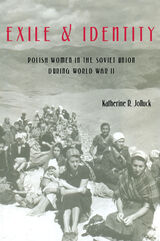
Upon arrival in remote areas of the Soviet Union, they were deposited in prisons, labor camps, special settlements, and collective farms, and subjected to tremendous hardships and oppressive conditions. In 1942, some 115,000 Polish citizens—only a portion of those initially exiled from their homeland—were evacuated to Iran. There they were asked to complete extensive questionnaires about their experiences.
Having read and reviewed hundreds of these documents, Jolluck reveals not only the harsh treatment these women experienced, but also how they maintained their identities as respectable women and patriotic Poles. She finds that for those exiled, the ways in which they strove to recreate home in a foreign and hostile environment became a key means of their survival.
Both a harrowing account of brutality and suffering and a clear analysis of civilian experiences in wartime, Exile and Identity expands the history of war far beyond the military battlefield.
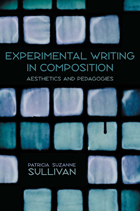
Sullivan unpacks the work of major scholars in composition and rhetoric and their theories on aesthetics, particularly avant-gardism. She also relates the dialectics that shape these aesthetics and sheds new light on both the positive and negative aspects of experimental writing and its attempts to redefine the writing disciplines. Additionally, she shows how current debates over the value of multimedia texts echo earlier arguments that pitted experimental writing against traditional models. Sullivan further articulates the ways that multimedia is and isn’t changing composition pedagogies, and provides insights into resolving these tensions.
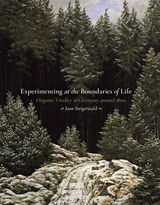
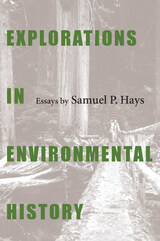
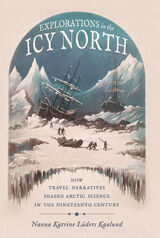
Science in the Arctic changed dramatically over the course of the nineteenth century, when early, scattered attempts in the region to gather knowledge about all aspects of the natural world transitioned to a more unified Arctic science under the First International Polar Year in 1882. The IPY brought together researchers from multiple countries with the aim of undertaking systematic and coordinated experiments and observations in the Arctic and Antarctic. Harsh conditions, intense isolation, and acute danger inevitably impacted the making and communicating of scientific knowledge. At the same time, changes in ideas about what it meant to be an authoritative observer of natural phenomena were linked to tensions in imperial ambitions, national identities, and international collaborations of the IPY. Through a focused study of travel narratives in the British, Danish, Canadian, and American contexts, Nanna Katrine Lüders Kaalund uncovers not only the transnational nature of Arctic exploration, but also how the publication and reception of literature about it shaped an extreme environment, its explorers, and their scientific practices. She reveals how, far beyond the metropole—in the vast area we understand today as the North American and Greenlandic Arctic—explorations and the narratives that followed ultimately influenced the production of field science in the nineteenth century.

In this foundational study, Friedrich Steinle compares the influential work of Ampère and Faraday to reveal the prominent role of exploratory experimentation in the development of science. While this exploratory phase was responsible for decisive conceptual innovations, it has yet to be examined in such great detail. Focusing on Ampère’s and Faraday’s research practices, reconstructed from previously unknown archival materials, including laboratory notes, diaries, letters, and interactions with instrument makers, this book considers both the historic and epistemological basis of exploratory experimentation and its importance to scientific development.
Winner of the 2017 Ungar German Translations Award from the American Translators Association

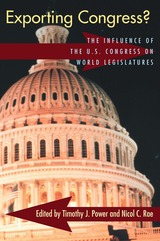
The United States Congress is often viewed as the world's most powerful national legislature. To what extent does it serve as a model for other legislative assemblies around the globe? In Exporting Congress? distinguished scholars of comparative legislatures analyze how Congress has influenced elected assemblies in both advanced and transitional democracies. They reveal the barriers to legislative diffusion, the conditions that favor Congress as a model, and the rival institutional influences on legislative development around the world.
Exporting Congress? examines the conditions for the diffusion, selective imitation, and contingent utility of congressional institutions and practices in Canada, the United Kingdom, Germany, the European Parliament, and the new democracies in Latin America and Eastern Europe. These scholars find that diffusion is highly sensitive to history, geography, and other contextual factors, especially the structure of political institutions and the balance of power between the executive and legislative branches. Editors Timothy Power and Nicol Rae place the volume's empirical findings in theoretical, comparative, and historical perspective, and establish a dialogue between the separate subfields of congressional studies and comparative legislatures through the concept of legislative diffusion.

Mexico's colonial experience had left a bitter legacy. Many believed that only the physical removal of the old colonial elite could allow the creation of a new political and economic order. While expulsion seemed to provide the answer, the expulsion decrees met stiff resistance and caused a tug-of-war between enforcement and evasion that went on for years. Friendship, family influence, intrigue, and bribery all played a role in determining who left and who stayed. After years of struggle, the movement died down, but not until three-quarters of Mexico's peninsulares had been forced to leave. Expulsion had the effect of crippling a once flourishing economy, with the flight of significant capital.


Winner of the 2004 Cave Canem Poetry Prize
The poems in Eye of Water are derived from the narrator’s experiences in what she calls her “waking.” She traces inspiration to “the beginning of myth, to Eve in the Garden of Eden” and states: “We could spend our lives unraveling the mistake and discover that life was one great big ‘chore,’ and inescapable. And the path is full of missteps and accidents because we cannot (or prefer not to) remember all that got us to that moment. My body seems to be a symptom of the past, so no matter who touches me, all the ghosts are waiting there. The ‘chore’ becomes how to survive despite the flaws of our humanness that makes us brutal at times.”
READERS
Browse our collection.
PUBLISHERS
See BiblioVault's publisher services.
STUDENT SERVICES
Files for college accessibility offices.
UChicago Accessibility Resources
home | accessibility | search | about | contact us
BiblioVault ® 2001 - 2024
The University of Chicago Press









